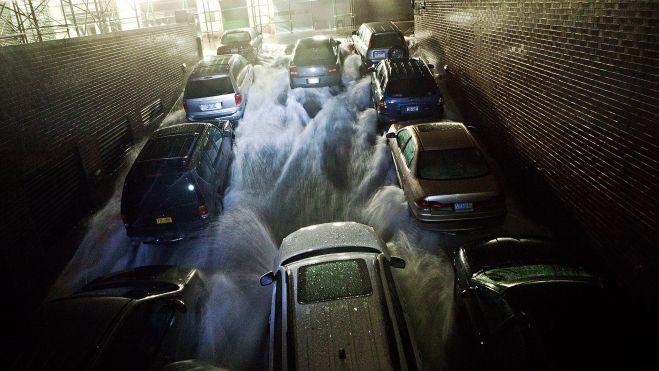Climate disruption has given us some very stark images last year – the huge satellite picture of Hurricane Sandy over the Eastern United States, cars bobbing up from underground carparks in New York, teenagers clinging to trees, and houses looking like island surrounded by lapping water in the Southern US. Floods in Brazil, deadly cold snaps in Europe and fire and flood in Australia. Sometimes is seems as though there is nothing we can do and there is no will for change.
 NewYork, 29 Oct 2012: Rising water, caused by Hurricane Sandy, rushes into an underground parking garage in the Financial District of New York City.
NewYork, 29 Oct 2012: Rising water, caused by Hurricane Sandy, rushes into an underground parking garage in the Financial District of New York City.
Photo by Andrew Burton/Getty Images
Earth Hour is a powerful referendum on climate change this is a signal that despite the climate deniers, despite the other issues that we all have to deal with, despite the gloom and pessimism, globally people care and want to see action on climate change. Earth Hour is a global movement sponsored by the WWF, which has been adopted by thousands of towns and cities in 152 countries in all 7 continents: in 2013 over a billion people will be involved. Concerned citizens are asked to turn out their lights for a single hour: 8:30 to 9:30 on March 23rd. A wave of darkened towns and cities will sweep around the globe, starting in Australia and New Zealand as each country reaches 8:30pm to visibly demonstrate that there is a will for change.
So what can be done?
Halting the seemingly relentless climb of CO2 in the atmosphere will require large-scale solutions, but will also require each of us to reduce our own electricity use. In Bermuda we burn fossil fuel for electricity so it converts directly into carbon dioxide emissions, but also into dollars flying out of our pockets. Basic energy saving ideas can save you at least 10% of your power bill. Here are some: Plug hot water heaters and heated towel rails into timers, turn off lights, turn off air-conditioning when you are not at home, set the thermostat up a couple of degrees on your cooling, unplugging chargers. When you walk into a dark room at night, it isn't really dark – frequently there are numerous small red or green lights shining back at you – each of those is burning electricity and many of them can be turned off.
Not all climate feedback loops are vicious: Australia recently discovered that its demand for power is going down – several years earlier than predicted. This is because of social, technological and economic amplifiers, for example – if someone puts a solar hot water system on their roof then they often spread the word among their friends: increased demand results in lower prices, and their awareness is boosted so they are more careful about power use in other areas. Reduced demand on the grid means reduced power losses in lines and switches. This is a virtuous cycle and one we can easily establish here.
As the Earth Hour organization puts it: "There is no doubt about it: the world is facing some of the most critical environmental challenges in its history. That may make the journey to a sustainable future seem difficult to imagine, but it is far from impossible. Change this big needs you. It needs every one of us. Together our individual actions add up to make a difference collectively. In fact, change is already underway."
Come and be Counted
So come and be counted: Greenrock and partners on the Earth Hour Council — BELCO, City of Hamilton and the Bermuda Government Departments of Sustainable Development and Energy — are throwing a party. In fact this is our 4th year running! We are having great entertainment, the famous BELCO bikes, free movies, a glow in the dark fun-run.
Join the party at City Hall on March 23rd from 5pm - 10pm.
City lights out for Earth Hour from 8:30pm - 9:30pm
FREE * COMMUNITY EVENT * ALL ARE WELCOME!
Let's take a stand and take it visibly together.
Go online to www.earthhour.org to get inspired, and go to greenrock.org/earthhour to see the event line-up and how you can join in.
Let's use Earth Hour, March 23rd, as a global symbol that we do care.
(Oh and when you come to the party – don't forget to turn out your lights at home!)

